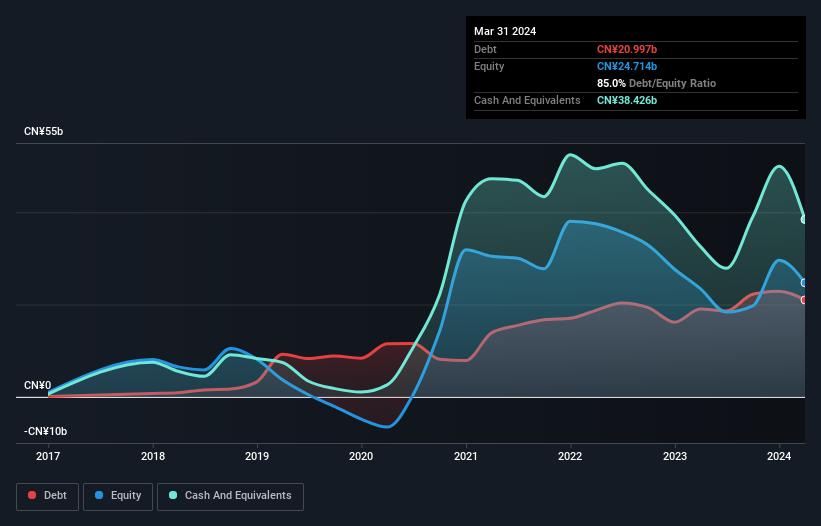
Legendary fund manager Li Lu (who Charlie Munger backed) once said, 'The biggest investment risk is not the volatility of prices, but whether you will suffer a permanent loss of capital.' It's only natural to consider a company's balance sheet when you examine how risky it is, since debt is often involved when a business collapses. We note that NIO Inc. (NYSE:NIO) does have debt on its balance sheet. But the real question is whether this debt is making the company risky.
What Risk Does Debt Bring?
Debt assists a business until the business has trouble paying it off, either with new capital or with free cash flow. Ultimately, if the company can't fulfill its legal obligations to repay debt, shareholders could walk away with nothing. However, a more usual (but still expensive) situation is where a company must dilute shareholders at a cheap share price simply to get debt under control. Of course, the upside of debt is that it often represents cheap capital, especially when it replaces dilution in a company with the ability to reinvest at high rates of return. When we think about a company's use of debt, we first look at cash and debt together.
View our latest analysis for NIO
How Much Debt Does NIO Carry?
As you can see below, at the end of March 2024, NIO had CN¥21.0b of debt, up from CN¥19.0b a year ago. Click the image for more detail. However, it does have CN¥38.4b in cash offsetting this, leading to net cash of CN¥17.4b.

How Strong Is NIO's Balance Sheet?
According to the last reported balance sheet, NIO had liabilities of CN¥51.1b due within 12 months, and liabilities of CN¥28.4b due beyond 12 months. Offsetting these obligations, it had cash of CN¥38.4b as well as receivables valued at CN¥5.29b due within 12 months. So it has liabilities totalling CN¥35.8b more than its cash and near-term receivables, combined.
This is a mountain of leverage relative to its market capitalization of CN¥54.5b. This suggests shareholders would be heavily diluted if the company needed to shore up its balance sheet in a hurry. While it does have liabilities worth noting, NIO also has more cash than debt, so we're pretty confident it can manage its debt safely. There's no doubt that we learn most about debt from the balance sheet. But ultimately the future profitability of the business will decide if NIO can strengthen its balance sheet over time. So if you want to see what the professionals think, you might find this free report on analyst profit forecasts to be interesting.
In the last year NIO wasn't profitable at an EBIT level, but managed to grow its revenue by 9.6%, to CN¥55b. That rate of growth is a bit slow for our taste, but it takes all types to make a world.
So How Risky Is NIO?
By their very nature companies that are losing money are more risky than those with a long history of profitability. And in the last year NIO had an earnings before interest and tax (EBIT) loss, truth be told. And over the same period it saw negative free cash outflow of CN¥16b and booked a CN¥22b accounting loss. However, it has net cash of CN¥17.4b, so it has a bit of time before it will need more capital. Summing up, we're a little skeptical of this one, as it seems fairly risky in the absence of free cashflow. When analysing debt levels, the balance sheet is the obvious place to start. However, not all investment risk resides within the balance sheet - far from it. Be aware that NIO is showing 2 warning signs in our investment analysis , you should know about...
Of course, if you're the type of investor who prefers buying stocks without the burden of debt, then don't hesitate to discover our exclusive list of net cash growth stocks, today.
Valuation is complex, but we're here to simplify it.
Discover if NIO might be undervalued or overvalued with our detailed analysis, featuring fair value estimates, potential risks, dividends, insider trades, and its financial condition.
Access Free AnalysisHave feedback on this article? Concerned about the content? Get in touch with us directly. Alternatively, email editorial-team (at) simplywallst.com.
This article by Simply Wall St is general in nature. We provide commentary based on historical data and analyst forecasts only using an unbiased methodology and our articles are not intended to be financial advice. It does not constitute a recommendation to buy or sell any stock, and does not take account of your objectives, or your financial situation. We aim to bring you long-term focused analysis driven by fundamental data. Note that our analysis may not factor in the latest price-sensitive company announcements or qualitative material. Simply Wall St has no position in any stocks mentioned.
About NYSE:NIO
NIO
Designs, develops, manufactures, and sells smart electric vehicles in China, Europe, and internationally.
Adequate balance sheet and slightly overvalued.
Similar Companies
Market Insights
Community Narratives


